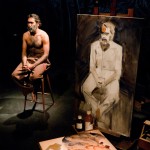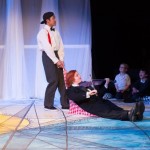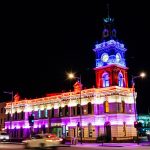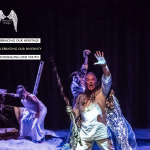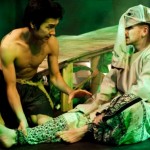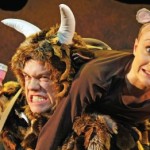Wittenberg
Genre: Comedy Drama
Venue: The Gate Theatre (Above the Prince Albert Pub) 11 Pembridge Road, London, W11 3HQ
Low Down
The programme verifies that the location before me represents Wittenberg, a place that changes the history of European Christiandom when in 1517 Martin Luther nails 95 theses (arguments) to the Castle Church door refuting Rome’s right sell his German parishioners indulgences (a kind of down payment for the remission for sins). More importantly, in doing so, he questions the Church’s spiritual authority… and so the Reformation begins. It is also clear from the outset of the play that Wittenberg is a university town, which is important enough location to have lived in Christopher Marlowe’s and William Shakespeare’s imaginations when they connected their tragic heroes, Faustus and Hamlet respectively, to it.
Review
Opening the theatre programme, it is striking how quickly the subtitle for David Davalos’s Wittenberg of “A Tragical-Comical-Historical in Two Acts” propels thoughts of Polonius and his feigning intellectualism in Act 2, Scene 2 of Hamlet as he advises young Hamlet on “tragical-comical-historical-pastoral, scene individable, or poem unlimited”. And then comes further and more worrying thoughts. Does that mean that there will be a good deal of ‘spotting historical and literary allusion’ for the rest of the evening? Hasn’t Stoppard’s Rosencrantz and Guildenstern shown us enough about using Elizabethan stagecraft to explore the existentialist angst?
However the questions are quickly dismissed as we encounter the stage design, a set consisting of dilapidated and dusty shelving, religious paintings and a crucifix or two. A damaged and dirty heraldic crest hangs gingerly at the centre of a curtained proscenium arch which resembles the curtained area on an Elizabethan theatre.
What kind of a playwright does Wittenberg make Davalos? Comic-Absurdist? Tragi-Brechtian? What is obvious from the programme is that Davalos’s fascination with history and with the European literary canon are a major part of his dramaturgy as the play superbly shows the tensions involved in measuring truth and authenticity alongside realising an entertaining stage play.
The linchpin of the drama is the trio of characters Father Martin Luther (Andrew Frame), Hamlet(Edward Franklin) and Dr John Faustus (Sean Campion) who together create a novel unholy ‘trinity’ as both Luther and Faustus claim Hamlet ‘as a son’. Hamlet, on the other hand, is not so clear which ‘father’ he should obey: the priest or the philosopher (or that matter his Royal father back in Denmark)?
From my viewing, in placing these known histories and fictional stories within his own invented narrative of university life at Wittenberg, Davalos repositions the key dramatic elements of ‘time’ ‘space’ and ‘action’ in his play in as in a kaleidoscope. There is a hard-edged definition and a disciplined logic to each episode in the play’s two-act structure. For instance, Hamlet‘s ‘antic disposition’ is give a subtle origin with breath-takingly metaphorical power as the audience becomes aware that the young prince’s reading of Copernicus’s thesis in Poland faces him with the total revision of scientific law as it had been known since antiquity.
Davalos’s attention to anachronistic elements within the play’s metatheatrical structure comically replaces sixteenth century objects like the comic creators of the Stone Age in the Flintstones. However, in Wittenberg the analogy is invariably in terms of live performance evoking either the Elizabethan stage itself – the trapdoor, the appearance of ghostly characters – or one of its derivatives such as Faustus’s Brechtian –styled cabaret act.
Conversely, Davalos also maintains dramatic tension by disrupting obvious parallels, creating moments of surprise. For instance, it is Faustus who goes around nailing notices and not the history-making Luther. On the other hand, the fictional Helen is not depicted as Helen of Troy but as an ex-nun seduced (she says freed) by Faustus to forsake her vow of chastity. Perhaps, rather esoterically, Davalos is having a bit of an ‘in-joke’ with historians as it was Luther in real life (& not Faustus in Marlowe’s play) that marries the ex-Benedictine nun, Katharina von Bora.
The strength of the writing is well matched in Wittenberg in the play’s performances. Sean Campion’s Faustus and Andrew Frame’s Luther are a great partnership, with each performer seemingly calling up the best in each other. The ale-drinking bar scene was particularly outstanding as Luther explains his realisation of a loving God to his doctor & friend Faustus who in counterpoint focuses on understanding the event as a bowel movement.
Edward Franklin portrays a meek and gentle Hamlet . He is every mother’s frightened child and Franklin holds the poignancy of the sensitive child amazingly well in the scene when he tells Dr Faustus that he’s been ‘born again’ in Jesus.
Sophie Britten as the ‘Eternal Feminine’ shows versatility in her four roles. In general, though, I wondered why the only doubling up of parts in the play was by the actress playing two ‘whores’ (Gretchen & Helen) and two ‘madonnas’ (Mother Mary & Lady Voltemand) . Certainly, each role ‘serves’ to catapult the action of the play onto another plane – for instance, Gretchen’s receipt for bought indulgences propels Martin Luther into writing his treatises and the vision of Mary Mother of God gets the lost Hamlet to be re-born in Christ – but in my opinion, the gender politics of Wittenberg seems the least developed aspect of the play.
Even with this limitation noted, the experience of viewing Wittenberg is highly recommended. Its staging depicted a place where the paradoxes of religious faith and scientific truth coexist in a productive tension. Ironically at this moment in time, it is even perhaps a reminder that Christianity too had its own form of a‘Arab Spring’ beginning in a place called Wittenberg. Ultimately, Wittenberg is a magnificently contemporary drama bursting with paradoxes about our freedom of choice and our yearning for certainty.
Reviewed by Josey De Rossi Thursday 1st September
Website :
www.gatetheatre.co.uk
